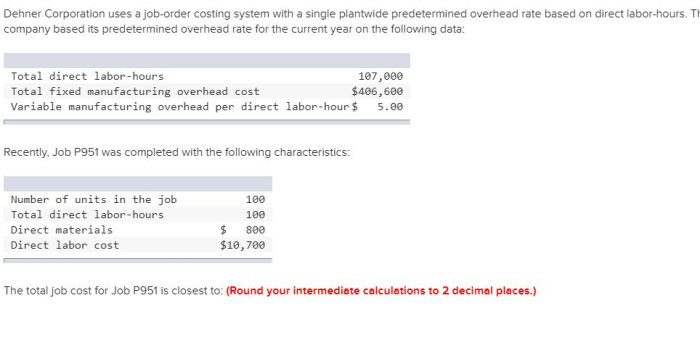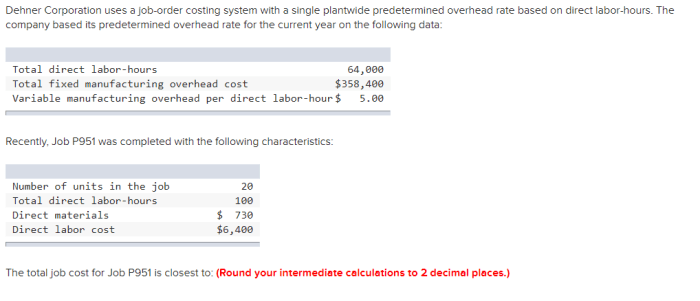Dehner corporation uses a job order costing system – Dehner Corporation’s implementation of a job order costing system stands as a testament to its commitment to accurate cost tracking and profitability optimization. This system empowers the company to allocate costs precisely to specific jobs, enabling informed decision-making and enhanced financial performance.
Through the meticulous assignment of costs to individual projects, Dehner Corporation gains invaluable insights into the profitability of each undertaking. This granular data enables the company to identify areas for cost reduction, optimize resource allocation, and maximize overall profitability.
Introduction to Dehner Corporation and Job Order Costing System: Dehner Corporation Uses A Job Order Costing System

Dehner Corporation, a leading manufacturer of industrial equipment, employs a job order costing system to track costs and enhance profitability. Job order costing assigns costs directly to individual production jobs, providing detailed information for each project.
Benefits of Using a Job Order Costing System for Dehner Corporation
Dehner Corporation benefits from using a job order costing system in several ways:
- Accurate cost tracking for each job, enabling the company to price products competitively.
- Improved profitability by identifying areas of cost overruns and inefficiencies.
- Enhanced decision-making by providing data on the profitability of specific jobs and product lines.
Challenges and Limitations of Using a Job Order Costing System
Despite its benefits, job order costing systems also pose challenges:
- Complexity and time-consuming implementation and maintenance.
- Difficulties in accurately assigning indirect costs to specific jobs.
- Potential for errors in data collection and allocation.
Best Practices for Implementing and Using a Job Order Costing System
Effective implementation and use of a job order costing system requires:
- Accurate data collection and documentation.
- Regular review and analysis of cost data.
- Utilization of technology to streamline processes and improve accuracy.
Future Trends and Considerations for Dehner Corporation’s Job Order Costing System, Dehner corporation uses a job order costing system
Future trends and considerations for Dehner Corporation’s job order costing system include:
- Automation and artificial intelligence to enhance data accuracy and reduce manual effort.
- Integration with enterprise resource planning (ERP) systems for seamless data sharing.
- Customization to meet specific industry requirements and business needs.
FAQ Guide
What are the primary benefits of Dehner Corporation’s job order costing system?
The system enables precise cost allocation, facilitates profitability analysis, and supports informed decision-making.
How does the system contribute to cost management at Dehner Corporation?
It provides detailed cost data for each job, allowing for the identification of cost-saving opportunities and optimization of resource allocation.
What are some of the challenges associated with implementing a job order costing system?
Accurate cost assignment can be complex, and the system requires diligent data collection and documentation.


